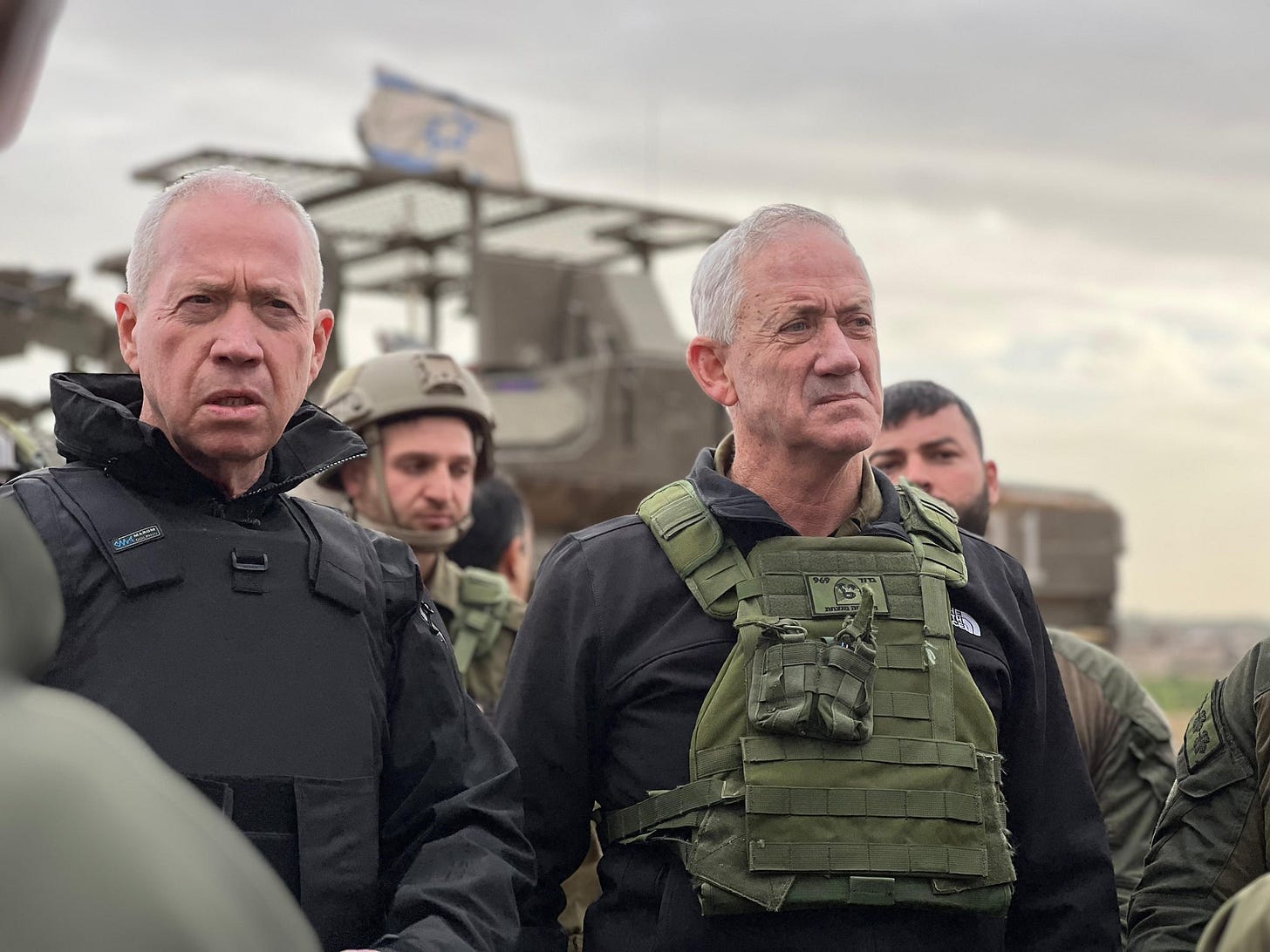When Waging War Collides With Playing Politics
Israeli politics is quickly spiraling out of control and leading the country down a potentially devastating path.
Please consider supporting our mission to help everyone better understand and become smarter about the Jewish world. A gift of any amount helps keep our platform free and zero-advertising for all.
You can also listen to the podcast version of this essay on Apple Podcasts, Google Podcasts, and Spotify.
It is no secret that Israelis are mourning and struggling in many ways.
Hefty amounts of anger, dismay, and recrimination have been suspended in favor of national unity, but behind the makeup, Israel is struggling politically.
While there is no such thing as a country with political perfections, Israeli democracy has always been a bit of a dumpster fire. Members of Knesset (Israel’s legislature) regularly scream at and scold each other, and citizens are also not ones to hold back. Just five days after the Palestinian massacre in Israel, an Israeli made it clear how he feels about the government, telling a minister, “You ruined this country!”
Israelis have long been guided by a principle of not airing their political dirty laundry to the world, preferring to keep it “in-house.” But now Israel is on the world stage as it aims to eradicate the fascist, genocidal terror group Hamas from Gaza. And while it is true that, as Israeli President Isaac Herzog recently said, “no Israelis in their right mind” are considering the peace process right now, it is also true that Israeli politics is quickly spiraling out of control and leading the state down a dangerous path.
To be sure, the trauma inflicted by the deadliest day for Jews since the Holocaust — with terrorists killing some 1,200 Israelis and kidnapping around 250 others — has not faded, neither for citizens nor politicians (who, after all, are people). One reason why October 7th remains so painful for Israelis is the unquestionable support for the 132 hostages still being held in Gaza, and for their families. Photos of the hostages are everywhere and relentless campaigning by the families is covered daily by Israeli media.
“For the rest of the world, October 7th is something that happened three months ago, but Israelis are still living it every day,” said commentator Chemi Shalev.
Within Israel, the media does not focus on the unfortunate situation in Gaza. For most Israelis, the primary concern is doing whatever it takes to keep them and their country safe and restore their shattered sense of security.
This unshakable pain is a key reason why polls in Israel show consistently high support for its military response in Gaza against Hamas, even as optimism about whether the IDF can achieve its stated goals has started to disintegrate.
This past Thursday, war cabinet minister Gadi Eisenkot went on national television in Israel to decidedly criticize Prime Minister Benjamin Netanyahu’s pledge to completely defeat Hamas, suggesting that such rhetoric is unrealistic.
“Whoever speaks of absolute defeat is not speaking the truth,” said Eisenkot, just hours after Netanyahu vowed to continue the war until “complete victory” over Hamas. And asked whether Israel’s current leadership is telling the public the truth, Eisenkot’s response was soberly simple: “No.”
Truth be told, Eisenkot is a politician who would not say anything publicly without the prior approval of Benny Gantz, the party leader of National Unity, of which Eisenkot is a member. Gantz, for his part, has been playing politics as well, refusing to participate in multiple press conferences with Netanyahu. His stance is that he only speaks alongside the prime minister when it is strictly about the war and not related, implicitly or explicitly, to political matters.
According to opinion polls released last week, Gantz would easily form a ruling coalition if elections were held today, and he trumps Netanyahu as the public’s preferred prime minister.
Certainly not oblivious to this, Netanyahu gave a defiant solo press conference on Thursday, saying: “Whoever is talking about the ‘day after Netanyahu’ is essentially talking about the establishment of a Palestinian state with the Palestinian Authority.”
Most Israeli citizens are opposed to the establishment of a Palestinian state, Netanyahu said, and he would always resist it. The decades of the Israeli-Palestinian conflict, he declared, are “not about the absence of a state, a Palestinian state, but rather about the existence of a state, a Jewish state.”
Netanyahu might be right, but he cannot ignore the multiplying groups of Israeli citizens who are increasingly opposed to his reign as prime minister. The war appears to be losing momentum, which is in part because of the particular nature and demands of the campaign in Gaza — and in large part, too, because of the absence of clear political direction.
This week, IDF chief Herzi Halevi reportedly warned that the gains made in more than three months of fighting risk erosion “because no strategy has been put together for the day after,” and Gantz wrote a letter to Netanyahu demanding decision-making now. Gantz wants Netanyahu to allow the government to move forward with decisions regarding:
Who will control the Philadelphi Route along the Egypt-Gaza border, as well as the Rafah Crossing
When will residents of the north be allowed to return to their homes (Netanyahu has twice delayed meetings with local mayors on this issue.)
A deadline setting how long Israel is willing to give diplomatic efforts to resolve tensions with Hezbollah before it turns to more significant military action
The formation of a mechanism for providing humanitarian aid to Gazans in areas from which the IDF has evacuated
A plan for who will rule Gaza if and when Hamas is removed from power
A reassessment of the war aims and an updated version that takes into account the developments of the last three months
“Netanyahu’s insistent refusal to hold substantive discussions on ‘the day after’ for Gaza makes perfect political sense for him personally,” wrote David Horovitz, The Times of Israel’s founder. “The far-right allies on which his premiership depends seek permanent Israeli rule over Gaza and the revival of Jewish settlement there. Netanyahu may not want Israel to retake full responsibility for the governance of 2.3 million Hamas-indoctrinated Gazans. But — as has been the case since his hardline coalition took power a little over a year ago — he dares not risk falling from power by defying Bezalel Smotrich and Itamar Ben Gvir.”
Sensing that Smotrich and Ben Gvir, both extreme right-wing coalition members, are also becoming more fed up with Netanyahu, the Israeli premier reportedly offered two outsiders to join the wartime coalition, perhaps as quasi-replacements to Smotrich and Ben Gvir.
Avigdor Liberman, one of these quasi-replacements, confirmed to the Israeli news site Ynet that “there was an offer from Netanyahu, they wanted me to commit to not leaving during the war period. I told them that they were confused,” which is a bad Hebrew translation. What Liberman would have said in English is: “I told them they’ve gone mad.”
While ministers and Knesset members from Netanyahu’s Likud party are projecting a united front in support of the party leader, a growing number of them believe that his days at the faction’s helm are numbered.1
Behind the scenes, Likud members have begun to gravitate toward possible successors, but there is no clear-cut successor, and the plurality of potential successors is partly responsible for the fact that Netanyahu is still prime minister.
In addition, no one in the Likud wants to be the first to challenge Netanyahu publicly during wartime; therefore the timing of any political move depends on two factors: Benny Gantz and protestors.
Gantz has said that his party will remain in the government only as long as he feels it is relevant to decision-making for the war. One of the critical impending decisions is whether or not to open another front on the northern border with Hezbollah in Lebanon — and Gantz wants to be part of that decision.
However, should a northern front be avoided or Gantz decide that he is no longer relevant, his leaving the government would likely serve as a signal that the political fight is on. That, coupled with an expected wave of mass protests, could be enough for Likud members to move against Netanyahu.
Those around Netanyahu fear exponential frustration among members of his party, in what could be a joint move with the opposition parties to oust him. As part of the containment battle, the prime minister has been trying to reinstate ministers who resigned under the Norwegian law, using the pretext of closing non-essential offices for wartime budgetary reasons. But a senior member of the Likud party cut to the chase, saying: “Public savings are not as interesting to Netanyahu as the concern about unruly Members of Parliament.”2
Another scenario, a source said, is that Netanyahu himself precedes the wave of would-be protests by calling for an election himself, thereby avoiding the momentum that such a wave could create for his rivals.
This is most probably one of the main reasons why the vital “day after” debate and decision-making process have not been seriously addressed in Israel’s security cabinet; one effort last week dissolved into a political ambush of the IDF chief of staff, who contends that the army he oversees is fighting a highly complex campaign in Gaza without actually knowing what it is expected to accomplish and protect.
With this in mind, it is entirely unsurprising that the families of many of the hostages still held in Gaza are urging a deal with Hamas, even at the price of an elongated ceasefire that could hamstring Israel’s war aims; Gantz and Eisenkot are widely reported to support such a deal.

U.S. President Joe Biden’s administration — without whose military supplies Israel could not continue to fight, and whose representatives regularly participate in Israeli war cabinet discussions — is watching all this play out with mounting dissatisfaction.
Biden is of course facing growing pressure in an election year over his support for Israel and opposition to a permanent ceasefire, and Netanyahu’s concerns about his domestic political circus surely do not resonate particularly well with Biden’s administration and Democratic party.
Iran is also facing growing pressure amongst its people, whose frustrations with their government are said to be skyrocketing. Despite the Ayatollah’s attempt to whip up Iranian support for the Palestinians and hostility against Israel, the Iranian people remain largely unmoved.
“As the regime became more fanatical in its antipathy towards Israel, Iranians themselves became uneasy, reflecting wider disaffection with the Islamic Republic itself,” according to Ali Ansari, a professor of Iranian history at the University of St Andrews. “As Iran’s political and economic situation has declined so, too, the popular criticism of revolutionary indulgence, be it in Syria, Palestine, or indeed Ukraine, has intensified.”3
But to pretend that the Iranian regime cares about the pulse of its people is to pretend that a hotdog is a sandwich. This is why there is no coincidence that swelling division across the Israeli political scene is being mirrored by more and more Iranian aggression in the region. The Iranians detect weakness coming out of Israel, the very weakness that, at least in part, enabled October 7th.
Could Iran’s supreme leader, Ali Khamenei, be contemplating trying to deliver a knockout punch?
In the meantime, Netanyahu and his defense minister, Yoav Gallant, have tried to demonstrate a fierce, dynamic front, as little more than political theatre for both Israelis and the world — even as the two of them are barely on speaking terms, according to people familiar with their relationship.4
“If the fate of Hamas is not complete dismantlement, we will not be able to live in the State of Israel,” Gallant recently told one of the Israeli Navy’s commando units.
But if Israeli politicians don’t get their act together, it might not matter if Hamas is completely dismantled. Sociopolitical implosion, rather than external threats, could seal the Jewish state’s fate.
“The Benjamin Netanyahu era is over, sources in Likud say.” The Jerusalem Post.
“נתניהו חושש ממרד בליכוד, ושואף להחזיר "אצבעות בטוחות" לכנסת.” Ynet News.
“Iranians know who their enemy is, and it’s not Israel.” Engelsberg Ideas.
“Split in Israel’s war leadership breaks into the open.” Financial Times.




Several things are becoming clear as the war proceeds: Hamas is so well entrenched that, given the restrictions under which the IDF is being forced to operate, it will take months to slowly and systematically destroy Hamas completely. Meanwhile, Hamas supporters and sympathizers all over the world are working diligently and effectively to broadcast the suffering of poor, innocent Gazan civilians and the refusal of Israel "to give peace a chance." This puts Biden under pressure to show he's not insensitive to the suffering of the poor, innocent, Hamas-loving Gazans and to bring the conflict to an end. Bibi is trying to hold the line because he understands that everything depends on destroying Hamas once and for all, or else all the Israeli soldiers and civilians who have died so far will have died for nothing.
Meanwhile, instead of rallying around him and standing strong, Netanyahu's rivals as well as his coalition partners circle like sharks in the water who smell blood. It's not a pretty picture.
Having reflected on my previous comment! The situation for Israel is untenable, so many countries are against you, making your future actions extremely dangerous, whatever course you take.